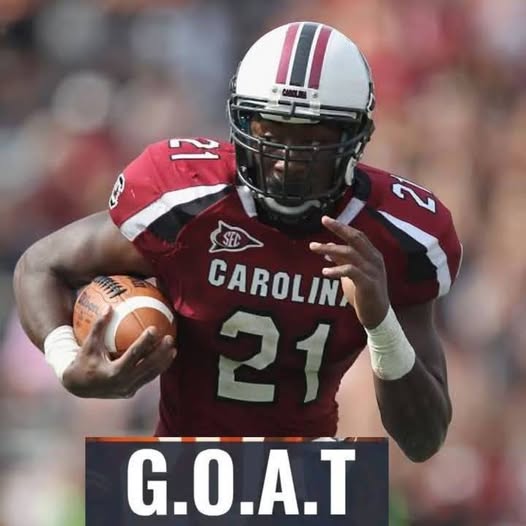Early Life and College Career
In a landmark recognition of collegiate athletic excellence, South Carolina Gamecocks legend George Rogers has been named the Greatest of All Time (GOAT) in college football, surpassing notable figures such as Herschel Walker of Georgia, Tim Tebow of Florida, and Archie Griffin of Ohio State. This accolade, reported by ESPN, underscores Rogers’ exceptional contributions to the sport during his tenure at the University of South Carolina.
Born in Duluth, Georgia, George Rogers emerged as a formidable running back during his time at the University of South Carolina from 1977 to 1980. Under the guidance of head coach Jim Carlen, Rogers quickly became a cornerstone of the Gamecocks’ offense. His sophomore year saw him amass 1,006 rushing yards in just eight games, despite sharing carries with fellow sophomore Johnnie Wright. By his junior year, Rogers had elevated his performance, rushing for 1,681 yards and earning first-team All-American honors from the Associated Press and Newspaper Enterprise Association. He concluded his collegiate career with a stellar senior season, leading the nation with 1,781 rushing yards and securing the prestigious Heisman Trophy in 1980.
The 1980 Season: A Historic Campaign
The 1980 season was a defining period for both Rogers and the South Carolina football program. As an independent team, the Gamecocks faced a challenging schedule, yet Rogers’ consistent performance propelled them to an 8–4 record. He surpassed the 100-yard rushing mark in every game that season, including a notable 168-yard effort against Georgia, a team led by freshman sensation Herschel Walker. Despite the Gamecocks’ 13–10 loss in that matchup, Rogers’ individual excellence remained evident.
Rogers’ outstanding season culminated in the awarding of the Heisman Trophy, making him the first and only South Carolina player to receive the honor. His jersey number 38 was retired during halftime ceremonies at the Gamecocks’ final home game of the season, a testament to his impact on the program.
Career Achievements and Legacy
George Rogers concluded his college career with 5,204 rushing yards, the highest total in South Carolina history, and 31 rushing touchdowns. His 27 games with over 100 rushing yards, including a streak of 22 consecutive such games, highlight his consistency and dominance on the field.
Beyond his statistical accomplishments, Rogers’ influence extended to the broader college football landscape. His success paved the way for future Gamecocks and elevated the national profile of South Carolina’s football program. His induction into the College Football Hall of Fame further cements his legacy as one of the sport’s all-time greats.
Comparison with Other Legends
Rogers’ recognition as the GOAT places him ahead of other legendary figures in college football. Herschel Walker, despite leading Georgia to a national championship in 1980 and winning the Heisman in 1982, was outperformed by Rogers in their head-to-head matchup during Walker’s freshman year.
Tim Tebow, known for his leadership and dual-threat capabilities, secured two national championships and a Heisman Trophy during his tenure at Florida. Archie Griffin remains the only two-time Heisman winner, achieving the feat in 1974 and 1975 with Ohio State.
While each of these players left an indelible mark on the sport, Rogers’ combination of individual excellence, consistency, and impact on his program distinguishes him in the annals of college football history.
Post-Collegiate Career
Following his illustrious college career, George Rogers was selected as the first overall pick in the 1981 NFL Draft by the New Orleans Saints. He made an immediate impact, leading the league in rushing yards during his rookie season and earning Pro Bowl honors. Rogers later joined the Washington Redskins, where he contributed to the team’s Super Bowl XXII victory. His professional success further underscores the exceptional talent and work ethic that defined his football journey.
George Rogers’ designation as the Greatest of All Time in college football by ESPN is a fitting tribute to a player whose achievements transcended statistics and accolades. His legacy is characterized by unparalleled performance, leadership, and a lasting impact on the University of South Carolina and the sport as a whole. As fans and historians reflect on the rich tapestry of college football, Rogers’ name rightfully stands at the pinnacle.



